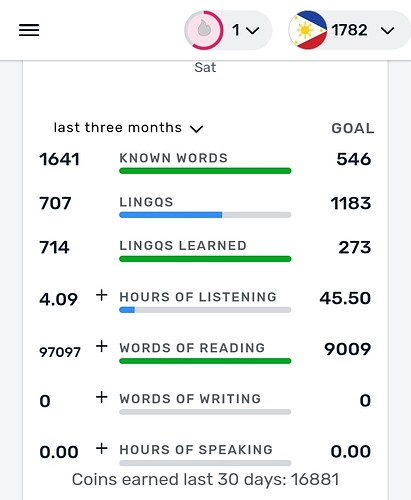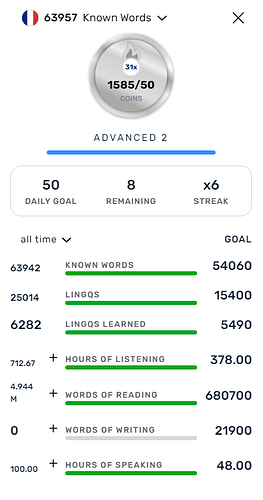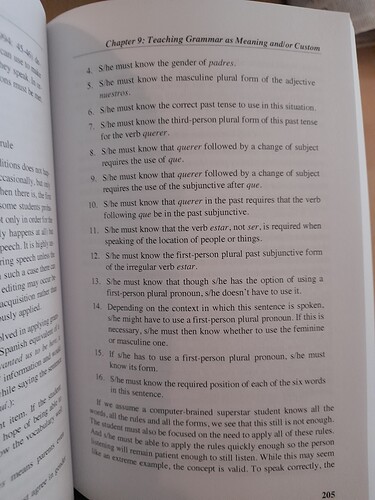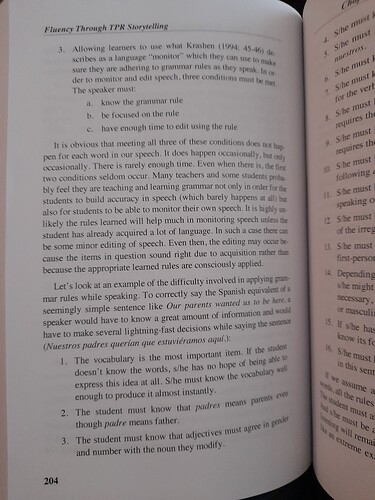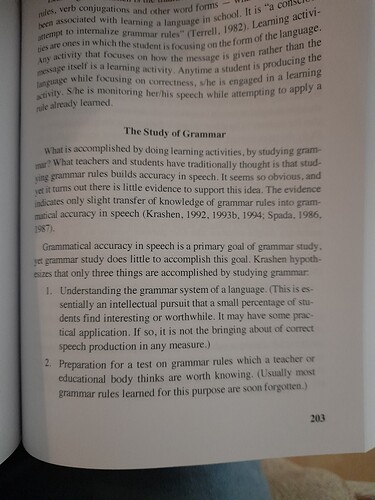I could try to write about my personal failure with language starting with my useless father, may he rot in hell, telling my mother and grandmother not to teach me Polish. Or now starting with the failure to learn Tagalog over the past 12.5 years here in the Philippines where my friendships have been damaged by it as well as my 25 year relationship. I skip over the failure of Spanish with good grades but totally worthless grammar crap and memorization leading to money, time and energy wasted with those classes.
Friends failed to help with Tagalog. I took lessons with three people spending $5,000.00 for about 5 years. A total waste.
Then I saw Poly-glot-a-lot and Natural Learning explained. It was a sickening struggle to get people to help me and I finally paid to have children’s books read to me. To get 1,500 hours took too long. Then I found out just reading the text was not right. So now I just have the pictures used and the reader makes up a story. The other half of the time pictures are described in detail.
I added LingQ after waiting for the delayed addition of Tagalog and then several questions I had. I asked the questions since I wanted to have some confidence that more years would njt be wasted.
So where am I now? Over a month doing LingQ and still incapable of speaking or understanding conversation I hear.
So where does all this lead to. Being alone, lonely and isolated with thoughts best not written here.
I need advice but not how wonderful others are doing. Great for them. I need help.
What all have you been doing in LingQ with Tagalog? I see you’re near 2000 words known. I don’t know if that’s representative of where you currently are at, or if you feel you actually know more from your previous experiences. However, it takes a lot more words to understand and communicate beyond the everday sort of things.
Do you feel you can communicate basic things? Hello, how are you? HOw much does this cost? Ordering at a restaurant?
Do you think Lingq is helping? How are you using Lingq?
I do not know the mahic number of words to be able to speak. That number of words is just the ones they colorize. The number of words actually in all the stories read is much greater.
I do practically nothing with Tagalog since the magic of Natural Learning which is supposed to have one start saying things has not taken place. I have a pile of books here and one is supposed to be the bible of storytelling in teaching language. In it are a few pages from Krashen on what happens when learning grammar and memorizing then steps of creating each sentence. That is what I do and am always wrong. Natural speech even for the simplest sentence does not take place.
I can’t help but to feel a bit of an attack. That I do not need. I get attacked enough.
No one is attacking you here. If you want help you’re going to need to specify what you’re doing so others can make potential suggestions or confirm that you may be on the right path with some things.
Since you haven’t really specified what you are doing currently with LingQ I can only offer some general suggestions. There is no magic. It takes time ( a lot) and sometimes you may need to work at things specifically.
In a general sense, here’s what I do (maybe it’s helpful, maybe it’s not). Certainly this is not the only way but it’s what I do:
-
Read A LOT. Whatever content you can get your hands on. In LingQ, use the mini stories or other content that is already there. Try to find some content that interest you and import it.
-
Use sentence mode. Read the sentence. Do you know the meaning of the sentence as a whole? Click the translate button to show the translation for the sentence. Were you in the ballpark? Do you have some blue or yellow words that aren’t evident from the context? Look those up. Now re-read the sentence with any of this newfound knowledge and try to absorb that meaning. Play the audio for the sentence and read along to get familiar with the sounds
-
Go through the lesson again with the audio reading + listening.
-
Listen to the audio for the lessons on its own.
-
Rinse/repeat with a new lesson.
Your vocabulary will increase. I don’t have a magic number either…but it’s a lot. On LingQ, to get to a B2-ish/C1-ish level of vocabulary for most languages you’re looking at 30,000-40,000 or more words known. Some languages a fair amount more. It takes time. Especially if you can’t spend a lot of time with it. (I’ve been working on German for 6-7 years and I’d only call myself intermediate level–maybe not even that in the case of listening and speaking).
Can you understand others that speak to you? If not, you either don’t have enough vocabulary yet, or you may need to listen more. Try to find authentic speaking on youtube or movies? Get the transcripts if you can, your import the audio (convert to mp3) and import into LingQ which you can use to create the transcript if one is not available. You have to listen a LOT. That, to me, is the most difficult part with conversations. I can fumble around and say something (quite incorrectly, but sufficient), but I often struggle to understand what someone just said. So I’ve needed to focus on this. I’ve been doing this by listening to more conversational content recently.
If you are needing to work on speaking then try speaking to yourself. Or find something in your native language and try to say it in Tagalog. Not word for word…but just try to convey the meaning in whatever words you can use. If you are stuck, use DeepL to help. Keep doing this. Think about the things you say in the course of a day in your native language and try to do this excercise in Tagalog. One thing I’ve been doing is using the mini-stories in English and translating them (as best as I can) to German, as a way of trying to speak. That way I always have something to practice and don’t need to come about with ideas on what to speak about myself.
You could also try Italki or something like that to find tutors that will speak with you and maybe offer some advice.
Good luck!
I joined LingQ and follow the pattern of first reading the 1 through 60 stories which LingQ has for Beginner 2. I had finished Beginner 1. I read the story making yellow many of the already blue words they had chosen. Some blues I know so I remove the color. Most words are not colorized. How they think those without any knowledge knkw them is a mystery. Some of the ones not colorized I turn yellow if I do not know the word or if I want it reviewed once again.
Sometimes I add a definition or make changes to those given if there are problems with the definition. After I click the the review icon at the bottom right and keep going through tge choices until no number appears. Then I listen to the recording. While it is good to hear not sure it helps in talk in the real world. Then I click translate to see read the story with translation. It lets me know if there are things I missed in understanding. BTW there tend to be poor translations in part. When I notice it and have it confirmed you know they need to have all the translations checked.
After I move to the next story. I am almost finished with this series. There are two others but I think there was another. I will ask their staff when I think I am done with all Beginner material if I missed anything. I want to do all Beginner first befire going to intermediate.
I also have people tell stories using just the pictures in children’s books plus describing other photos in detail.
The phenomenon that Krashen mentions on starting to speak has not happened with me after all I have done so far.
I have tried listening to movies, TV and radio and YouTube children’s videos. Total waste of time. I could watch a language in movies for a million years and get nothing. I have not met anyone who learned language like this or can explain how to make it work. It also creates such anxiety for me it ruins my entire day and I get angrier and angrier with Tagalog speakers. So I stick to these other methods.
I have no idea what to upload to LingQ and how to do it even if I had something. Do I upload Tagalog or English? Does it translate? All a mystery.
BTW most Filipinos are not cooperative and some hostile to those trying to use Tagalog. I openly call it a secret code they want to remain that way so they can talk about you in front of your face without you knowing what they are saying. This nasty habit is a fact. Even my spouse experienced it in the US when Filipinos assumed he was not Filipino. Here it happens as Filipinos have told me. I once witnessed one person I know tell off our mutual acquaintance for doing this nasty thing in the condo elevator.
I have not attended any Filipino gatherings in about nine years now since I end up alone in a crowded room. Translation lasts about five minutes. The worst was being told they would tell me later. Later never comes and how can they remember every word. So sitting in the condo alone is my prison. You all can guess at my increasing thoughts for such an existence.
Number of words
Years ago I read of estimates on the number of words one needs for conversational level in a language. German was 10,000, French 13,000, I think, Spanish 15,000 and English 20,000. I contacted the University of the Philippines language department and was told no such study has been done for Tagalog.
I see I read a lot. I have no idea where the bottom two take place. I was told by several people online and the staff that at one month I would notice something. Not sure what. It has listening at 45 hours as a goal. Do I need to listen over and over and over to each lesson to reach it.
First, welcome to the community, and I hope you are able to get onto the path you are looking for. I have found this community to be quite supportive and have learned much from them. I hope you will find the same.
I think what you are saying here is that some words you didn’t intend to mark “known” (or, as you say, not colorized) are marked as “known”. By default, LingQ moves words you leave blue to “known” if you move to the next page without lingq’ing them (making them yellow). So, it is possible that you are unintentionally making the words “known” by leaving them blue and then moving to the next page.
You can still LingQ the ones that you don’t know, but that have been marked “known”, in the same way you do with blue words as you go through the lessons.
If you want to change the setting so the blue words don’t move to “known” automatically when you move to the next page, you can do this under Settings>>Reader
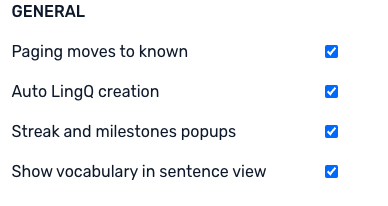
If you uncheck “Paging moves to known”, you would need to manually move any words to known from that point forward.
You are correct. Beginners will not understand native conversations or content like movies, TV and radio just by doing the mini-stories. Still, understanding clearly spoken audio meant for learners is important step along the way to comprehension of real world language.
I can understand your desire to progress quickly, given your experience. Even so, you can only start from where you are. It is a LONG process at the best. Putting a lot of pressure on yourself to improve more rapidly than you can in order to make up for lost time is a recipe for more misery.
I’m sure it is easier said than done, but I’d humbly suggest letting yourself off the hook (along with everyone else to whom you attributed your “failure”), and focusing on the things within your control each day from today to improve from where you are.
Set achievable goals based on things like words read per day, hours listened per day, etc. Celebrate your achievements. A mini-story read is a win. A half hour conversation with a native is a win, reading a chapter is a win, etc. Setting reasonable short term goals that you can achieve, sets your expectations more appropriately, so you can appreciate your progress, feel like a success and build confidence.
Best of luck to you!
I think what you’re doing sounds good that you describe in your post. I think you just need to stick with it. It takes time. BTW, you mentioned some words were not colorized…make sure that in the reader settings you untick the “paging moves word to known”. I have no idea why they still continue to set this as a default. For someone new to the software it is confusing as heck. You can get to this while in a lesson, click the 3 dot menu in the upper right. Then click Reader Settings. Then unlickc “Paging moves to known”. Unless you like it!
BTW, I quoted what you mentioned about Krashen. I don’t know what he has said. Can you elaborate?
In my opinion, it’s most efficient to learn vocabulary through reading, and looking up words. LingQ helps with this. One could also read articles on the internet and use google translate extension popup to do the same thing (just without tracking stats or having additional dictionaries and other features). Once you understand those words and their meanings, THEN you have the possibility to understand it through listening. Then you need to marry the two…reading and listening at the same time is helpful with this.
For uploading…you would, for example, find an article on the web in Tagalog. Then, if you install the LingQ browser extension, you would click that LingQ extension button to import that article into LingQ. Then it becomes a lesson for you to work on. That way, if you find content on the web that sounds interesting to you, you can focus on that. It also works for youtube videos that have captions. It’s best to find videos where someone has provided the captions, but the autogenerated ones on youtube can do in a pinch…they just don’t have punctuation.
You can also import DRM free books or netflix transcripts (not sure if there are some good tagalog movies on netflix?).
Sorry to hear about your experience with the Filipinos. I’ve heard the opposite before, but it could be a different experience in certain areas, or a general attitude to outsiders. That stinks…and yes, not helpful to learning. Are there any groups for expats or something you could join? Maybe they could be helpful?
ok - just to give you an idea of the time and effort it takes, these are my stats from the last 2.5 years in French (a language not “too” far from my native Dutch). I have a word count of 63k. While I can have a discussion and express myself on any subject without too much searching for words, I’m still not fluent:
You are clearly making progres; you have learned - according to your stats - 714 words/lingqs in the past 3 months. Although you may not realize it, the exposure to sentence structure will make it so that you have learned to interpret these words and sentences in a variety of contexts. You just need to continue.
To me it seems like you want a clear path as to when and where you will be where you need to be. The place best suited to help you, is a language school.
This may also be an indication of how long it takes to get to a certain level (doesn’t matter if it’s tagalog or anything else):
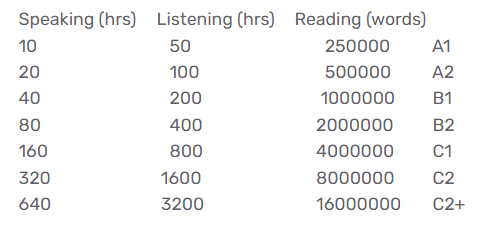
I can give you a doable guide that will give you “some results” in 90 days.
Read 5000 words every day. Listen 1 hour every day. Do it every day without exception for 90 days and you will see very clear results (you will not be a fluent language speaker by a long shot).
Krashen’s theories are based on “a lot” of language exposure. you are just not there yet. Unless you are spending the entire day learning, your journey will take years depending on desired fluency.
It’s actually very bad as far as Filipinos in the Tagalog region where Metro Manila is located in helping with language. I have seen few exceptions. I have written and spoken endlessly on this. One of my dozensbof comments have been to people directly is that I never knew anyone who did not help others with English. My warning on many platforms is to acquire Tagalog before moving here.
Expats are of two camps. One could care less about the language. I recall a Brit who said when I asked if he was learning Tagalog, " Oh that little thing." That is the attitude of that camp. The others such as myself experience hostility, ignoring us speaking Tagalog and laughter. Of course help is a struggle to find.
As I have stated, if I could retrieve all my posts and messages on this it would easily fill a 300+ page book using small font.
Filipinos also have serious issues with their own language. There are Filipino families that do not teach their children Tagalog or Filipino. Yep. This is not just high level knowledge but communicating on any level. Only English is spoken in their homes with TV programs restricted. While public schools use it private schools do not necessarily use it at all. My spouse had such students in his classes.
Another problem which I theorize has to do with lack of reading is grammar and vocabulary for a majority of Filipinos. A teacher told me he tested 200 senior level students on two words rin and din which mean the same thing. He said he knew I knew why each would be used. But none of his students could explain it. Actually all they had to do was think of the last letter of the previous word.
My spouse curiously at that same time tested his students on the word for the color orange. None of his 150 college level students at a pricey school knew it though he knew I did. Once they heard kahel some made fun about eating kahel. But the name of the fruit is not the same.
Yes, the state of language here is a problem and much worse than any articles you may read regarding tests. I and my spouse laughed at another article giving stats which are completely false.
Oh, I just saw what Krashen remark made. It would have been in one of the many videos online of his lectures. While he repeats important things in his lectures he always has something not repeated like a wonderful story about Michael Faraday. I tell people that story adding he was not a child prodigy but ended up as one of the top scientists who has ever lived. And how did he achieve that never attending schools or taking nonsense exams? He read. He read a lot.
It seems you have a lot of feelings of frustration and some of those come from feelings you are not progressing enough or fast enough. Some of that might be your expectations. As many people said here, it takes many hours to become fluent. So try not to feel frustrated if you feel you’ve been spending a lot of time and aren’t yet fluent. See if you can do things better than before, like understanding audio without looking at the transcript, etc, or reading different and more complex content with time.
You have to recognize it will take hundreds or even thousands of hours to be fluent. Especially if it’s far from your native language. So be patient. Make sure you are getting the right kind of input that will help you progress. But even with that, it won’t be instant. With the right type of material, however, you’ll be able to tell if you’re getting better-- you’ll be able to understand things you wouldn’t before, etc. It still takes time.
The “45” hours is the recommended per three months according to your screenhot. But I don’t know where they got those recommendations. SEems kinda low to be honest. 4 hours in three months is not enough IMO. Some people do an hour a day. Steve Kaufmann says he lists to the mini-stories a lot, up to 60 times even. Basically, though, you have to balance between repetition and novelty so you don’t get bored. if you find other beginner materials in Tagalog you like, you can upload them to Lingq to study them. For example, a children’s story or beginner textbook you might want to read or understand.
I haven’t used it, but it seems like Glossika might be a good resource for a beginner. They basically do spaced repetition with you repeating sentences out loud. Basically, as a beginner you are working to establish a foothold in the common vocabulary and structures of the language. Costs a bit though (Glossika)
Once you get advanced enough you can find podcasts and have Lingq trascribe them with AI. That will get a long way toward understanding real speech.
The other thing is Lingq won’t teach you how to speak. A lot of natives don’t like to practice with beginners since it means they can’t have normal conversations. It might be best to get a tutor on italki or somewhere like that.
My advice is, adjust your expectations, both of yourself and other people. Recognize the progress you have made because I bet you have made some.
Steve’s videos are great on this mindset about enjoying the journey-- I highly recommend watching them. Sometimes it feels you are going forward, sometimes back, but if you keep going, you will progress.
3 Stages of Language Acquisition - How Long Does it Really Take - YouTube
